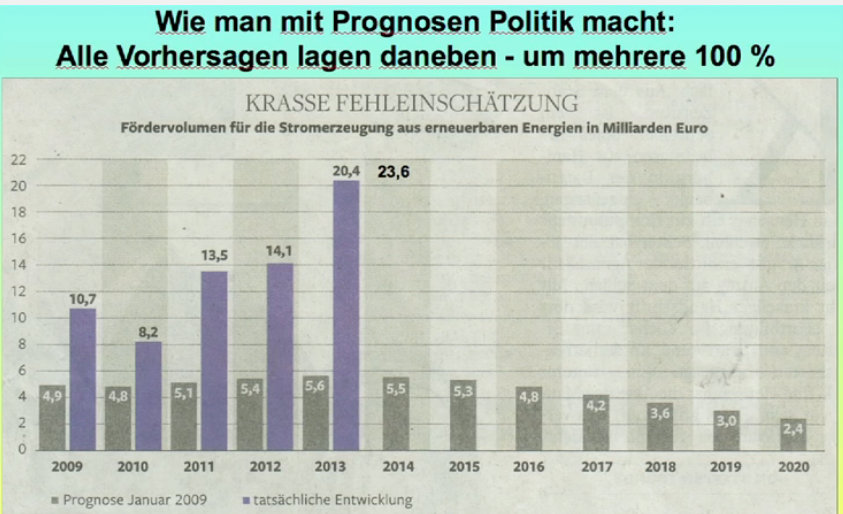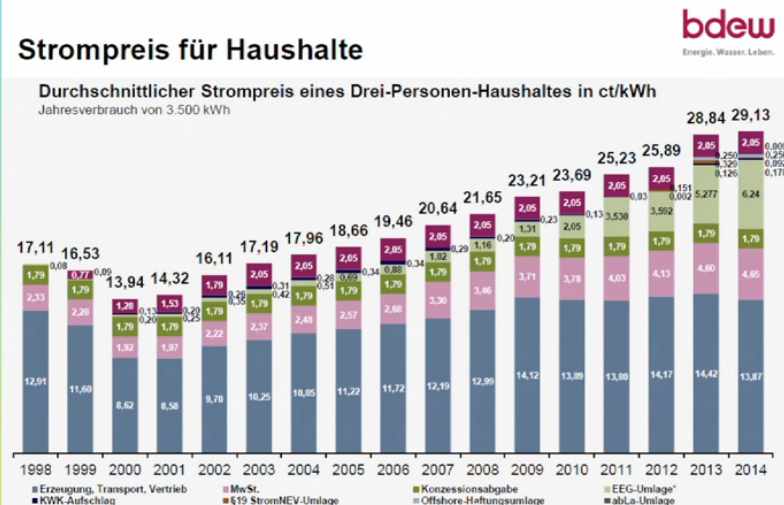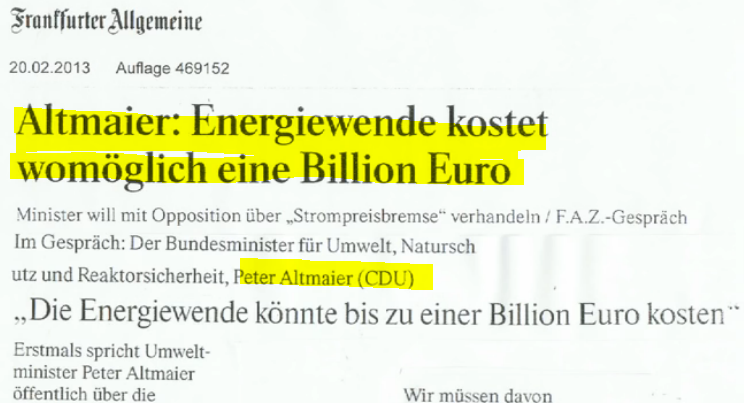The Germany-based European Institute for Climate and Energy (EIKE) held another conference on climate and renewable energy last March. One of the speakers was Prof. Dr. Dieter Ameling, an expert in heavy industry. EIKE has posted his presentation.
In the presentation Ameling calls Germany’s Energiewende (transition to renewable energies) a real threat to industry, warning that the country faces a de-industrialization.
Already, Ameling reminds us, every day the Energiewende in Germany is progressing and that the damage already done is getting even worse and that “foremost it will soon be irreparable“.
Subsidies’ vast divergence from earlier projections
At the 5:15 mark he calls the German government’s 2022 targets for renewables “economic nonsense” and will result in “electricity getting continuously more expensive“.
His following chart shows a comparison of the German government’s projected green energy subsidies compared to that of reality:
The gray bars show the government’s projected annual subsidies in billions of euros. The blue bars depict the real skyrocketing subsidies. In 2014 the subsidies rose even further, to 23.6 billion euros. Chart: Dr. Dieter Ameling.
“Unaffordable” and “absolute imbecility”
The big problem, Ameling emphasizes, is the huge supply-volatility in wind and sun, which are totally weather-dependent. At the 9:35 mark the retired professor calls the German state of Bavaria’s energy-mix plan for 2022 as something that “cannot function“…”is unaffordable“, and “is absolute imbecility“.
The chart at the 11:20 mark shows how Germany has one of the highest electricity prices worldwide, more than double the rate found in USA, Canada, or Russia.
At the 13-minute mark another chart shows the huge gap in natural gas prices between Germany (10.7 cents per gas unit) and the USA (only 3.7 cents per gas unit). Thanks to fracking, gas prices in USA have tumbled while in Germany poor households barely can afford to heat their homes.
Germany’s skyrocketing electricity prices
At the 13:34 mark Ameling displays a chart showing Germany’s electricity price development:
Since 2000 the price of electricity in euro-cents/kwh in Germany has more than doubled! Currently a 4-person household is paying over 366 euros a year just for the green energy feed-in tariffs alone. Ameling warns that figure will continue to rise rapidly.
Exodus of industry leaving Germany, Europe
Later in the presentation Ameling shows how the energy-intensive industries such as cement, glass, steel, chemicals etc. are being hit hard by the skyrocketing energy costs. In Germany alone 3.5 million jobs depend on the steel industry. At the 19:03 mark Ameling warns that the exodus of industry “has already begun” with heavyweight companies such as ThyssenKrupp, Norsk Hydro, BASF, SGL Carbon and Voest moving operations abroad.
1 trillion euros!
How much is Germany’s Energiewende projected to cost? In 2013 former Environment Minister Peter Altmaier told the Frankfurter Allgemeine Zeitung it would cost Germans 1 trillion euros!
At the end Ameling summarizes, announcing that the “Energiewende has failed” because it is simply too expensive and too volatile. The infrastructure that is needed to handle it is not even in place. Unless Germany radically alters the current direction of its Energiewende, Ameling says it will be “bye bye Germany“.
He ends the presentation with the following Friends of Science image, reminding us that CO2 is not even the driver of climate.









Hopefully the politicians will start to listen to reality in the not too distant future.
If German industry collapses, the rest of the EU will follow.
The effect world wide will be devastating to modern civilisation.
And all because of an irrational, unsubstantiated fear of a tiny little molecule that is the building block of all life on Earth.
Well, first, much of what is reported here has been in posts and comments on NTZ several times over the past few years. Still, it is nice to see “experts” reporting such things.
Second: That the subsidies are large (larger than expected) should not be a surprise. People with money to invest look for companies that have a business model that will return cash to the owners/shareholders. Apple Inc. does this by inventing products (a phone) that people will buy. Sticking with apples, an orchardist (working smart and hard) harvests fruits, sells these, and money flows from individuals to the grower. In the case of wind and solar the government takes money from people and makes it available for “harvest” by investors. So the company is harvesting taxes paid to the government and made available as simply as an apple is taken from a tree. A business has to be established to do the taking but technical innovation is not required nor is the special life-force of an apple tree required. I assume that I own a mutual fund that has stock in such a business. Thus, I have benefited from the German government making this process so simple. Thank you, citizens of Germany, for your tax money.
Regard Europe; Germany is your future.
..and over here in the US, our news media, (most) politicians, and current administration alternate between “La-la-la-la! CAN’T HEAR YOU!” and “Move along, nothing to see here…”
Stephen Richards, you are absolutely correct and what you say applies equally to the US: “Germany is your future.”
“warning that the country faces a de-industrialization.”
Not at all. The wind turbines will remain, and they look very industrial to me. Actually Germany looks more industrial than ever, there’s nearly no place where you can’t see a 150 meter high machine! Often on hilltops, so they’re visible for 50 km! They are the monuments to our genius!
“They are the monuments to our genius!”
Oh dear. 🙁
Makes us look like a mindless bunch of idiots !
So i guess China will deindustrialize soon as well?
They are making big moves on solar. And they are producing the modules.
http://www.bloomberg.com/news/articles/2015-05-18/get-ready-for-solar-boom-from-china-plants-as-asia-demand-swells
sod, you do realize that most of China does have more than the measly 800 sun hours a year that are the German average? Well maybe you don’t. In that case consider yourself smarter now.
As to Ameling: Nothing of what he says will make it through the giant propaganda wall that is called the German Media.
“In that case consider yourself smarter now.”
smarter than a 2 year old chimpanzee.. maybe. !
“sod, you do realize that most of China does have more than the measly 800 sun hours a year that are the German average? Well maybe you don’t. In that case consider yourself smarter now.”
Have you ever been nearly run over by a motorbike in China, because you did not hear it coming (electric engines are silent)?
Well maybe you have not. In that case consider yourself smarter now.
China is expanding its solar PV capacity at a massive speed and it also is moving fast into electric vehicles of all sorts.
They are not doing this to save the world, nor do they get subsidies from other parts of the world for doing so.
Democracy suffers from significant flaws. But the most dangerous flaw is that a democratically elected leader is able to impose policies that severely damage the country, but worse … the citizens of the country just allow it as part of the democratic process.
This is what is happening in Germany today. People know that Merkel’s green policies are insane, damage the economy, damage jobs growth, increase electricity prices, cause businesses to move to other countries, etc etc etc.
The generations that built up modern day Germany must look at this and wonder how the industrial might of Germany can be allowed to be attacked under the arrogant, ambitious and unscrupulous ideology of environmentalism which is slowly but surely is threatening freedom, democracy, the market economy and prosperity.
[…] … “Absolute Imbecility”! By P Gosselin, No Tricks Zone, May 18, 2015 https://notrickszone.com/2015/05/18/… The German ‘Energiewende’ – Finally One Step too Far? By Roman Kilsek, Breaking […]
[…] “Unaffordable” … “Absolute Imbecility”! By P Gosselin, No Tricks Zone, May 18, 2015https://notrickszone.com/2015/05/18/…The German ‘Energiewende’ – Finally One Step too Far? By Roman Kilsek, Breaking Energy, May […]